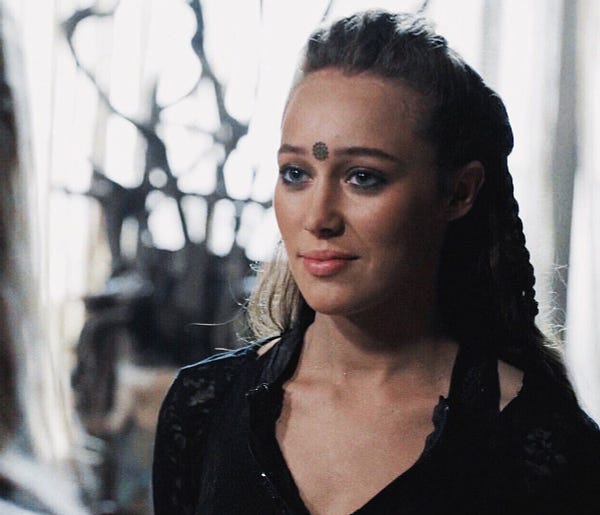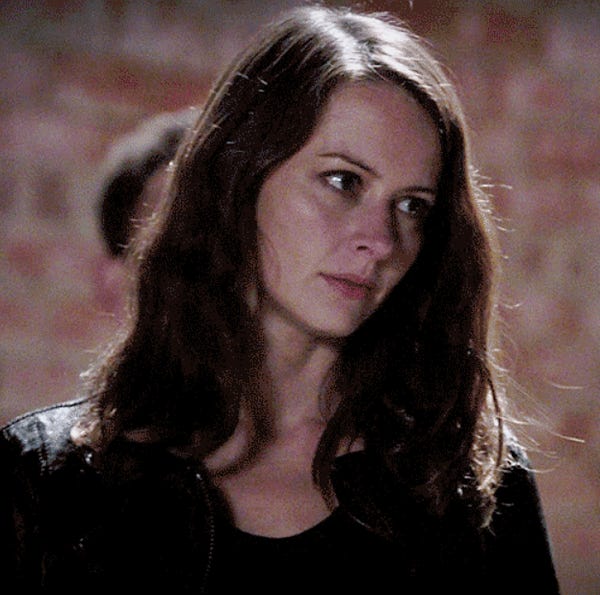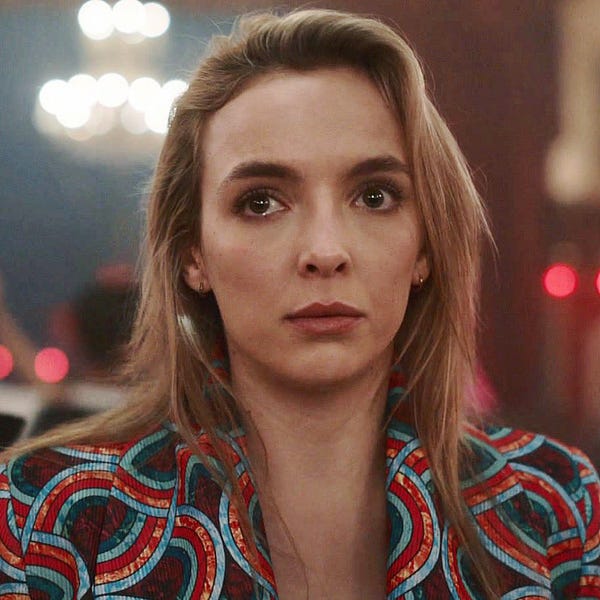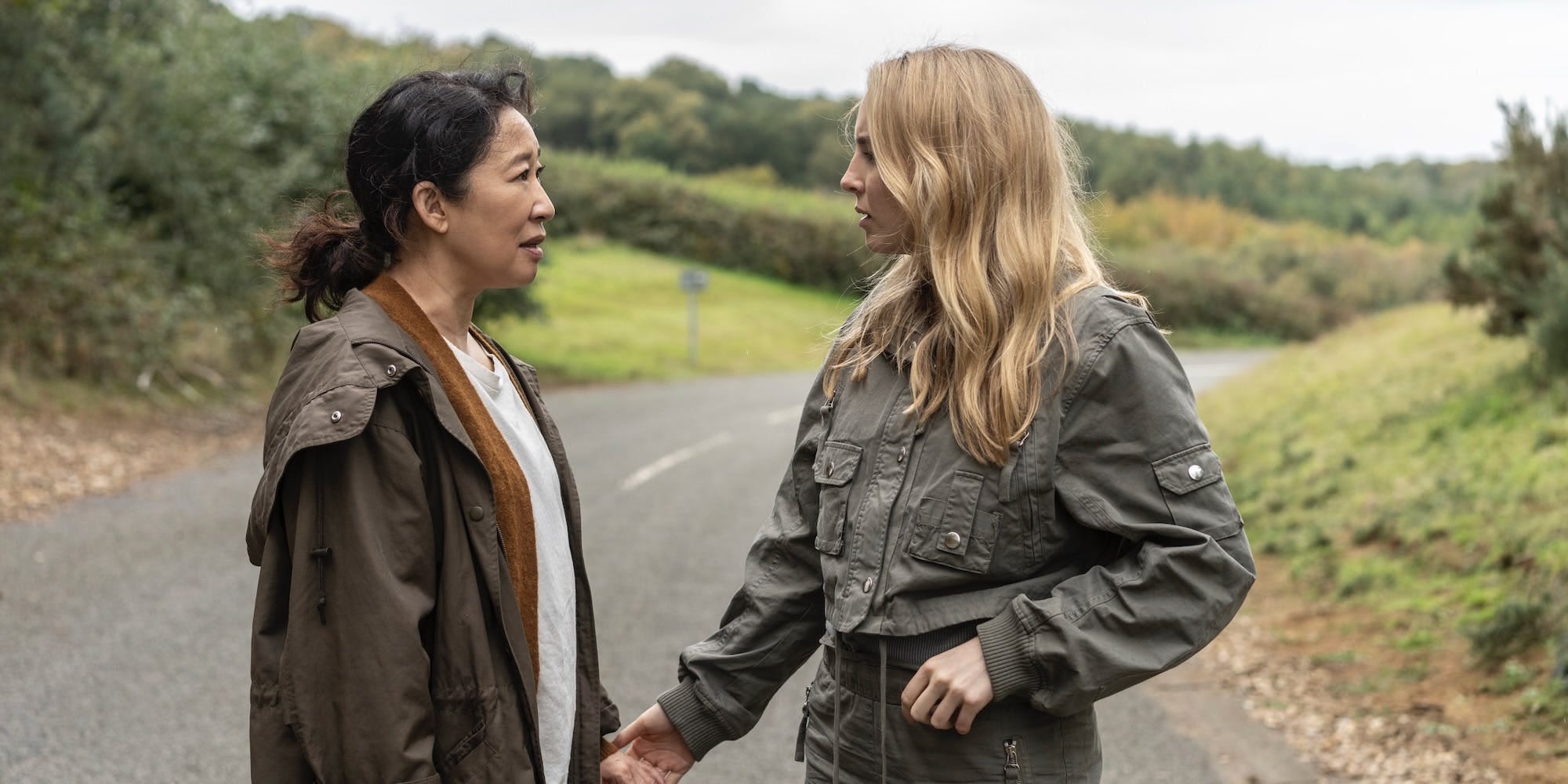On Killing Eve, The Death of Good Storytelling
This is the Sunday Edition of Paging Dr. Lesbian. If you like this type of thing, subscribe, and share it with your friends. A paid subscription gets you more writing from me and will help me keep this newsletter afloat. Consider going paid! Editors note: this post contains major spoilers for the finale of Killing Eve. In Season 4, Episode 4 of Killing Eve, a calculating woman named Hélène (played by the magnificent Camille Cottin) is sitting on the couch with our titular character. She and Eve (Sandra Oh) are discussing the topic of passion. “Do you know what passion is?” she asks. Eve doesn’t respond. “People think it’s sex, excitement, but the actual definition of passion is to suffer.” She’s talking about Eve’s relationship with Villanelle (Jodie Comer), of course, and Eve is somewhat affronted by the assumption that her desire for Villanelle is simply some sort of thinly-veiled masochism. Hélène’s definition of passion may be how she really feels about the concept, or perhaps it’s a thesis statement indicating the ethos of the show itself. Whatever the case may be, Hélène’s conversation with Eve gained renewed relevance for fans of Killing Eve this past week, who, for the most part, had a very negative reaction to the series finale, entitled “Hello Losers.” (And don’t we all feel that way?) To give you a concrete example of how the episode was received, it currently has a 2.7/10 fan rating on IMDB, compared to the Season 2 finale, which has a rating of 8.7. In a TV Line poll, 43% of the respondents gave the Season 4 finale an “F” grade. Specific fan reactions vary, but some common themes emerge. Many fans have described feeling disappointed, shocked, heartbroken, and even betrayed. One fan felt like the episode served as a “confirmation of [their] own internalized homophobia.” Other fans described the episode as heartless and disrespectful. The finale was widely criticized for both its uninspired writing and the ways it exemplifies the Bury Your Gays trope. Before we go any further, I suppose we need to discuss what actually happened. After a full season (or if we’re being honest, two seasons) of lackluster writing, Killing Eve ended on the most basic, derivative note one could imagine. The finale saw Eve and Villanelle finally reunited and on a mission to take down The Twelve, once and for all. The episode sees the pair escaping a Scottish island together, going on a road trip, and having their first, long-awaited “real” kiss. (A wonderfully joyful and meandering affair). After Eve had somehow managed to officiate a gay wedding (don’t ask) and Villanelle had finally succeeded in killing The Twelve, they reunite once again on the deck of a boat floating on the Thames, only for Villanelle to be fatally shot and die, floating in the river, with Eve reaching out to her. The last frame of the series is Eve screaming from the water, followed by “The End” written in Killing Eve’s famous blocky lettering. According to Season 4 showrunner Laura Neal, this is a redemptive ending for them both, as Villanelle has finally proved herself to Eve by dying to protect her and Eve is now able to start a new life. As if Villanelle was what was holding Eve back, rather than being the only thing that could set her free. Unsurprisingly, many fans did not buy this explanation of the ending, despite the very obvious metaphor of Villanelle sprouting bloody wings as Eve glances up at her in horror. But what about the finale was so upsetting to fans? Let’s start with the most common criticism that has been lobbied at the finale thus far: its association with the Bury Your Gays trope. If you weren’t aware, queer characters have been killed off in all forms of media for decades now – in part because The Hays Code, which defined the morality of American cinema, prohibited “positive” representations of queerness – but it became particularly noticeable in the last decade or so, especially for queer women characters. The most prominent and devastating example of the trope occurred in 2016, when Lexa (Alycia Debnam-Carey), a popular lesbian character on The CW series The 100, was killed by a stray bullet mere minutes after she slept with her love interest, Clarke (Eliza Taylor) for the first time. Lexa’s death sparked a movement – buoyed by hashtags like #LGBTRepresentationMatters and #BuryTropesNotUs – and over $179,000 has been raised for the Trevor Project in her honor after many fans became concerned about the mental health of their peers following the infamous episode. Since then, there has been more awareness amongst fans and television writers alike about the negative effects the trope can have. It can be hard to describe the moment of Lexa’s death to those who weren’t “there” – metaphorically, metaphysically, or culturally speaking – and the echoes of that event continue to reverberate today. Nonetheless, it does appear that things have gotten better in certain respects. It has seemed to me in recent years that the fan activism surrounding The 100, and the subsequent reckoning television seemed to have following that fateful episode, has had an effect on both the content we see and how it is perceived. Even when queer death does happen – and it is less common now – it is perceived differently. In part I think it's because one of the things the conversation surrounding the Bury Your Gays trope did was posit the worthiness of queer fans and queer people’s experiences and feelings in general. In some sense what this has done is make these instances of queer tragedy feel less like an affront. We now have the language with which to discuss this and the tools to work through it – and the understanding that such representations are not a reflection of our own worth. These discussions are one of the things that have allowed a show like Killing Eve to flourish in the first place. In earlier years, a show such as Killing Eve – which depicts a villainous, psychotic sapphic character – would likely have been seen as an affront by many, and potentially could have done damage to some viewers coming to terms with their own identity. (The predatory lesbian is a stereotype that many have internalized.) For example, Basic Instinct, one of the most (in)famous examples of the evil queer woman trope, was actually picketed by gay rights activists upon its initial release in 1992. Opinions on the film have evolved since then (I love it), but because it was one of the only prominent depictions of queerness on screen at the time – and it was presented and discussed without a lot of nuance – queer viewers were understandably worried about the effect it would have on the culture writ large. It’s because we’ve continued to have these discussions – about how the evil sapphic trope can be harmful but also incredibly fun – that a show like Killing Eve is able to become such a success. As such, on the surface it may seem like these conversations about the Bury Your Gays trope mean that queer death on-screen might be less offensive now or feel less impactful, but clearly, that is not always the case. In fact, some found Villanelle’s death on the show to be, in a very broad sense of the word, rather triggering. Many fans connected Villanelle’s death to other famous instances of the Bury Your Gays trope – such as Tara on Buffy The Vampire Slayer and Lexa on The 100 – because she died (and was shot, specifically) only a few moments after a romantic moment with her beloved. There’s a strong sense of déjà vu here, and not in a good way. This disturbingly common sequence of events, coupled with the perception that Villanelle was somehow being punished through her death, made some fans particularly upset. As lesbian writer Dana Piccoli succinctly put it on Twitter, “If the timeline of a queer character finally finding happiness then meeting a violent end is shorter than the time it takes to microwave a Hot Pocket, it’s probably gonna be an issue.”     Moreover, the ending feels doubly disrespectful because the show has always had such a strong queer and sapphic fan base, something that has undoubtedly contributed to the show’s success. Regardless of whether or not the show’s producers were trying to “court” a queer audience, a queer audience was what they got. Killing off not only Villanelle but most of the other queer women on the show as well is a decision that doesn’t sit right with many fans. That’s not to say that “fan service” – ie. giving fans exactly what they want – is the answer, but rather to point out that there was a clear disconnect between what fans love about the show and what the writers chose to focus on this season. Understandably, since the ending was so upsetting for many, there have already been efforts to erase or deny the final canon of the show. One fan re-worked the finale in order to create Killing Eve – the extended San Junipero ending. Other fans started whipping out their geometry skills to prove that Villanelle could still be alive based on the angle and trajectory of the bullets. As one person joked on Twitter, “imagine fucking up so severely that you see gay people doing maths.” If these reactions are any indication, the conclusion to the series was, for the most part, wholly rejected by fans. Context obviously matters in all of this, and reactions to a television show are always subjective. Not all queer viewers define every instance of queer death as an example of the Bury Your Gays trope, depending on the situation in which it occurs. For example, some fans of the Netflix series The Haunting of Bly Manor describe its conclusion as a way queer death can be done right, by way of honoring the importance of the central lesbian love story. (I am not among them – I agree with Shannon Keating’s criticism that the ending actually does a disservice to its characters.) All of this is to say that the definitions of these terms are not cut and dry, and that there is not one right or wrong answer as to if something is “good” or “bad” representation. (And perhaps this is not the question we need to be asking to begin with.) I don’t actually think the Bury Your Gays trope is the crux of the issue here, although fans’ experience with the trope is understandably coloring a lot of reactions to that divisive ending. The problem with terms like Bury Your Gays and Representation Matters is that they tend to flatten context. The issue is not necessarily that Villanelle died, but that the writing didn’t properly develop Villanelle and Eve’s relationship or do justice to the story. As a viewer, I didn’t expect a happy ending, nor do I think the show needed one to be successful (despite how the book series ended). Villanelle’s death wasn’t even particularly cinematic or shocking – it just felt lifeless, in every sense of the word. The ending would have come off very differently had the death been treated in a more tragic, romantic sense. For example, imagine if Eve and Villanelle had died together in an operatic, dramatic fashion. Such a conclusion might have alluded to the tragic romance of Romeo and Juliet, or the righteous bravery of Bonnie and Clyde or Thelma & Louise. A finale like this could have been tragic in the Aristotelian sense, rather than in the halfhearted manner in which it was conveyed to us. A happy ending, too, could have been made unconventional and fresh had the writers had the gumption or imagination to really take that leap. It’s not just the finale itself that made the ending so upsetting. The writers had all but stopped developing Eve and her relationship with Villanelle over the last season or two, which made the (much-awaited) romantic elements of the finale feel rushed. Even their kiss – which was wonderfully blocked and exquisitely acted – wasn’t given the time and attention it deserved. Indeed, most of what has been compelling about the show over the last couple of years has been Oh and Comer’s performances, which are always outstanding no matter the direction of the story. While the quality of the writing has gone down consistently since Phoebe Waller-Bridge left the show after Season 1, Laura Neal and her team are the worst offenders, watering down the once sizzling dynamic between Eve and Villanelle into something prosaic and trite. Rather than generating tension, as it did in Season 1, keeping Eve and Villanelle apart for most of the season only served to diminish what was compelling about them in the first place – their drive, their passion, their obsessions. I don’t think the show was ever queerbaiting, either. There was always an acknowledgment from the other characters in the show, even as early as the first season, that something – whether it be sexual, romantic, or some as-of-yet undefined feeling – was happening between the two women. That was never the question, as far as I’m concerned. The queerness was always in plain sight. Indeed, from the very beginning, the show has hinged on this sometimes unspoken, often destructive desire between Eve and Villanelle, one that tends to evade language entirely. Autostraddle writer Heather Hogan puts it like this:
There is a sense of taunting implicit in Killing Eve, especially in the last season, so I understand why some might use the term “queerbaiting” to describe the show. The last episode made much of what came before it feel like a total waste, especially since Eve and Villanelle’s relationship was so deep and raw prior to that point. As Caroline Framke puts it in Variety, “This absolute most basic way to end an otherwise complex story just made everything that came before it seem like an enormous tease.” In a sense, the show had betrayed its own principles at this point by flattening out the tension and complexity that defined the first two seasons. As creator Phoebe Waller-Bridge told Variety at the end of Season 1, “Every moment in this show exists so that these two women can end up alone in a room together. Really it would have been a betrayal to the audience if they didn’t come together in the end.” While they may have come together in a carnal sense in the finale – although maybe not, we never actually see them consummate their desires – the delicious attraction and repulsion that Waller-Bridge had so deftly evoked in Season 1 had all but left the building. Even the pacing and the structure of the episode was off. On Buffy, the context of Tara’s death mattered. Although her death itself remains an upsetting moment for many fans, what followed – Willow’s transformation into “Dark Willow” and her eventual ascension to becoming one of the most powerful witches of all time – at the very least added some narrative importance to her tragic death. In her review of the series finale, Autostraddle writer Kayla Kumari Upadhyaya – who enjoyed both the episode and the entire season much more than I – suggests that even just a moment longer, a couple beats following Villanelle’s death would have made all the difference. Ending the episode so abruptly – without actually illustrating the “rebirth” that Neal claims Eve experienced – doesn’t allow for any sense of closure. At least with Willow and Tara we were able to see the repercussions of Tara’s death and watch Willow go through her own process of grieving. No such time was given to honor Villanelle’s death. Instead of tragic catharsis, we are left with melancholia – a grief or loss not properly mourned. Eve, too, was denied that sense of closure. Some fans, clearly troubled by the lack of care given to Villanelle’s story, have taken to creating their own real-life memorials to the character. In the days following the finale, fans left flowers and chocolates underneath a Killing Eve pop-up shop in Liverpool, while others started a memorial on the Tower Bridge in London, the site of Villanelle’s death in the show. For these fans, it was important to give Villanelle the honor she never received in the series. Speaking with Elle, Laura Neal described efforts to make Villanelle’s death appear transcendent. According to Neal, Villanelle’s death was something of a triumphant moment for her, and it allowed both Villanelle and Eve to finally find redemption. But once again, this feels like a flattening of the messy, even disgusting or horrific dynamic between Eve and Villanelle, and the wonderfully perverse way the show illustrated queer desire in general. Even if Eve and Villanelle had both died – in a “blaze of glory” as Neal so aptly put it – it would have been a more deservedly poetic ending, rather than the tacked-on one we were given. And a happy ending for the pair – whatever that might have looked like – could have been surprising and shocking in its own way. Queerness doesn’t have to equate with joy or happiness, at least not in the normative sense of those words. Instead, the utility in such a sociopolitical orientation is its expansiveness and its insistence on pushing the boundaries. There was certainly nothing expansive or even mildly interesting about that ending, hackneyed allusions to transcendence notwithstanding. Death is not an inherently bad or negative ending, but without care or narrative consequence, it fails to satisfy even our desires for cathartic tragedy. It’s the death of a good story that’s really being mourned here. You’re a free subscriber to Paging Dr. Lesbian. For the full experience, become a paid subscriber. |
Older messages
Every Kristen Stewart Movie, Ranked
Sunday, April 10, 2022
Evaluating the Kstew Canon
The L Chart and the Living Archive
Sunday, April 3, 2022
"We're all connected, see?"
On (Lesbian) Beauty
Sunday, March 27, 2022
Gazing From Above and Below
'Stick It' To The Man
Monday, March 21, 2022
The Movie That Taught Us Everything We Need To Know About Queerness and Feminism
Jill Gutowitz Wants You To Know That ‘Girls Can Kiss Now’
Sunday, March 13, 2022
A Book Review
You Might Also Like
Mastering Circumstance
Tuesday, March 11, 2025
“If a man does not master his circumstances then he is bound to be mastered by them.” ͏ ͏ ͏ ͏ ͏ ͏ ͏ ͏ ͏ ͏ ͏ ͏ ͏ ͏ ͏ ͏ ͏ ͏ ͏ ͏ ͏ ͏ ͏ ͏ ͏ ͏ ͏ ͏ ͏ ͏ ͏ ͏ ͏ ͏ ͏ ͏ ͏ ͏ ͏ ͏ ͏ ͏ ͏ ͏ ͏ ͏ ͏ ͏ ͏ ͏ ͏ ͏ ͏ ͏ ͏ ͏ ͏ ͏
Don't Fall for This Parking Fee Scam Text 🚨
Tuesday, March 11, 2025
How I Use the 'One in, One Out' Method for My Finances. You're not facing any fines. Not displaying correctly? View this newsletter online. TODAY'S FEATURED STORY Don't Fall for the
Ollie Ollie Oxen Cheap
Tuesday, March 11, 2025
One of the last true "closeout" stores is a fun place to look closely ͏ ͏ ͏ ͏ ͏ ͏ ͏ ͏ ͏ ͏ ͏ ͏ ͏ ͏ ͏ ͏ ͏ ͏ ͏ ͏ ͏ ͏ ͏ ͏ ͏ ͏ ͏ ͏ ͏ ͏ ͏ ͏ ͏ ͏ ͏ ͏ ͏ ͏ ͏ ͏ ͏ ͏ ͏ ͏ ͏ ͏ ͏ ͏ ͏ ͏ ͏ ͏ ͏ ͏ ͏ ͏ ͏ ͏ ͏ ͏ ͏
“Olympus” by Matthew Olzmann
Tuesday, March 11, 2025
I was a cobbler in the house of the Gods. ͏ ͏ ͏ ͏ ͏ ͏ ͏ ͏ ͏ ͏ ͏ ͏ ͏ ͏ ͏ ͏ ͏ ͏ ͏ ͏ ͏ ͏ ͏ ͏ ͏ ͏ ͏ ͏ ͏ ͏ ͏ ͏ ͏ ͏ ͏ ͏ ͏ ͏ ͏ ͏
Harry has us blushing
Tuesday, March 11, 2025
— Check out what we Skimm'd for you today March 11, 2025 Subscribe Read in browser Header Image But first: Join the waitlist for a new premium Skimm experience Update location or View forecast
Fancy Flats Are Spring's #1 Shoe Trend & We're Obsessed
Tuesday, March 11, 2025
Give your heels a break. The Zoe Report Daily The Zoe Report 3.10.2025 There is so much to celebrate this week — and month, for that matter. There's Paris Fashion Week, which is well underway and
Dads, You Can Get in the Best Shape of Your Life With This Workout Program
Monday, March 10, 2025
View in Browser Men's Health SHOP MVP EXCLUSIVES SUBSCRIBE Dads, You Can Get in the Best Shape of Your Life With This Workout Program Dads, You Can Get in the Best Shape of Your Life With This
Meghann Fahy’s Master Plan
Monday, March 10, 2025
Today in style, self, culture, and power. The Cut March 10, 2025 CUT COVERS Meghann Fahy's Master Plan After breaking out on TV, Fahy stars in a big-screen thriller this April. She won't
EmRata Flaunted Pelvic Bone Cleavage, Aka "Pelvage," In The Tiniest Skirt
Monday, March 10, 2025
Plus, your love life this week, your daily horoscope, and more. Mar. 10, 2025 Bustle Daily Chet Hanks EXCLUSIVE Chet Hanks Has The Last Laugh It's easy to make assumptions about Chet Hanks, namely
The 20 best cookbooks of spring
Monday, March 10, 2025
NYC steakhouse sues Texas over attempted “Texts Strip” rebranding.

